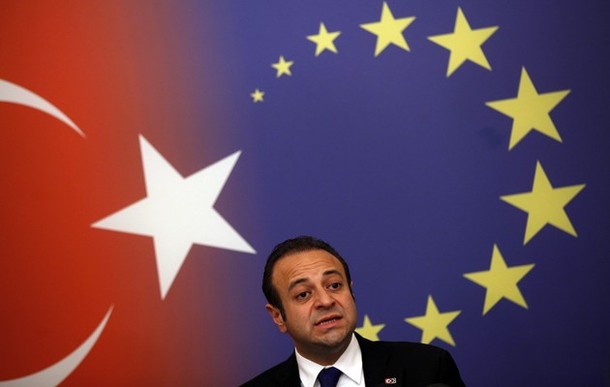Though his country has been aspiring to join the European Union since the 1960s, Prime Minister Recep Tayyip Erdoğan warns “the EU will lose Turkey” if action in accession does not happen by the 2023 centennial of the Turkish Republic.
Exceptional macroeconomic performance and the grandiose “neo-Ottoman” foreign policy of the ruling Justice and Development Party (AKP) have been game changers. The dysfunction of the EU itself has also weakened its appeal. Egemen Bağış, Turkey’s minister for EU affairs, recently declared, “We don’t want to join a bankrupt Union.”
Historically, Turks perceived EU membership as the ultimate fulfillment of the Kemalist vision of breaking away from the Ottoman past and occupying a well-deserved position in the West. Turkish aspirations began when the country first applied for associate membership of the European Economic Community in July 1959. Yet, accession negotiations commenced only in 2005 and since then, only one chapter of the thirty-five required by the acquis communautaire has been closed, indicating a long way for Turkey to gain full inclusion.
EU accession was highly appealing for Turkey especially in the 1990s and early 2000s, the belle époque of the organization and a tempestuous period for Turkey. EU membership provided a significant boost for countries such as Ireland, Spain, and Portugal, and Turkey had hopes of the same.
Since AKP ascended to power in 2002, however, they brought political stability and positive macroeconomic performance, turning Turkey into one of the fastest growing economies in the world with an annual growth rate of 5.5 percent. Turkey achieved this alone, without the EU’s contribution.
Positive economic trends were reflected in Turkey’s foreign policy as well. AKP broke away from the Kemalist foreign policy of the previous administrations and initiated a more active approach towards the Middle East—generally dubbed as “neo-Ottomanism”—while keeping EU integration as the number one foreign policy objective.
In recent years, Erdoğan and Foreign Minister Davutoğlu have been increasingly critical of the EU and have been leaning towards a greater Turkish presence in the Middle East. Commenting on the Arab Spring, Davutoğlu once stated a “new Middle East is about to be born. We will be the owner, pioneer, and servant of this new Middle East.”
Turks have become disenchanted by the slow pace of EU negotiations. According to a survey conducted earlier in December by Boğaziçi University, only 47.1 percent of Turks have a positive opinion of the EU, compared to 69.3 percent in 2003. Moreover, as a result of the ongoing financial crisis, most Turks see the EU as a falling star, especially compared with their own country’s economic performance and AKP’s “great power politics.”
Erdoğan recently generated controversy with talk of creating a “Turkish Lira-zone” as an alternative to the Eurozone. While this is unlikely to come to pass, the comment reflects both Turkish popular attitude towards the EU and the rising confidence of AKP.
Erdoğan’s and Bağış’ statements should be understood in this context, reflecting general Turkish disappointment with the EU and a sense that Turkey has caught up with, and even outperformed, the organization. Long-time voices, questioning why Turkey would join the West to become its most vulnerable, “second-class” member if it can also be a leader of the Middle East, are gaining more support.
Now, the question for Turkey is whether it is better for the country to be the weakest link in a stronger club (EU) or the strongest link in a weaker club (Middle East). On the one hand, being a weaker party in a stronger club is always a stimulating factor to produce better results, therefore the profitability of EU accession for Turkey—despite the organization’s current malaise—can further positive domestic developments just as it did in the past. On the other hand, the Middle East is still haunted and dissuaded by Turkish leadership in the not-so-distant past, constraining AKP’s Middle Eastern grand plan.
Obviously, the EU has the last word vis-à-vis Turkey’s accession. Recent developments are positive as members of the French Parliament called on President François Hollande to remove France’s veto on four accession chapters and the infamously hostile Greek Cypriot EU presidency will be replaced by Ireland’s openly friendly attitude towards Turkey’s bid in the first half of 2013.
But Turkey must seize the opportunity. Deserting the European path can only turn the country back to its past. Turkey must continue the reforms required to meet the EU’s accession criteria and fulfill Atatürk’s vision of becoming a full-fledged part of the West.
Peter Vincze is an intern with the Atlantic Council’s Dinu Patriciu Eurasia Center.
Image: reuters%208%2015%2012%20Turkey%20EU.jpg
